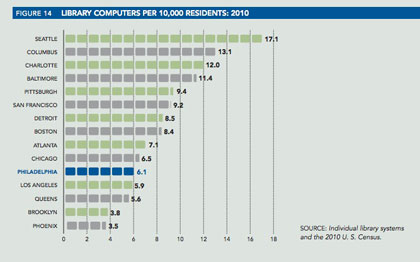
Sources: U.S. Census; FCC. Map courtesy of American University’s Investigative Reporting Workshop.
Last week at an event hosted at Penn’s Annenberg School for Communication and put together by the New America Foundation, academics, dataheads, advocates and media met to discuss the many data and mapping efforts that have coalesced recently around digital access and adoption issues in Philadelphia.
Much of the evening was spent debating the statistics: primarily, the oft-quoted stat that 41 percent of households in Philadelphia lack access to the Internet.
We’ve used that figure on many occassions. This reporter was a panelist at the event, there to promote the organization’s new Connect Philly tool.
Connect Philly: Addressing digital access issues
Where: City Hall: Conversation Hall
When: THURSDAY, April 5, 3 p.m. – 4 p.m.
What: We’ll continue this conversation during a panel discussion about Broadband availability and adoption moderated by Technically Philly this Thursday, with remarks by Mayor Nutter and Knight Foundation’s Donna Frisby-Greenwood.
So, where does that figure originate, and with what methodology was it calculated?
Well, as Pew Charitable Trusts project director Larry Eichel said at the event, it started with a joint poll developed in 2010 by the now defunct Pew Internet & American Life project and the Knight Foundation.
In an email to participants after the event, Eichel wrote: “In that poll, 66 percent of respondents said they used the Internet, and 90 percent of them said they use it at home. That means 59 percent use it at home, meaning that 41 percent do not.”
As he noted at the event, it’s not a completely pure methodology: the question asked did not take into account smaller details, like the possibility that they just might not use a home computer to access the Internet, despite having access at home. The question is what it is.
That’s perhaps the least of the city’s worries, if some additional data evaluations turn up valid.
Jacob Fenton, formerly of the Investigative Reporting Workshop, based in Washington, D.C., who spoke on the panel, ran some preliminary “sitting-at-the-kitchen-table-running-some-code” analysis and found that, based on 2010 Census data, only about 45.2 percent of households in Philadelphia have the Internet, based on a “broadband” standard of 768Kbps download / 200Kbps upload.
That analysis, though back-of-the-envelope, would suggest that 55 percent of city households dont have access in the home.
Technically Philly would not publish Fenton’s early figures, if not for a secondary “rough-and-ready” estimate from Temple University urban studies professor Charles Kaylor.
He’s long suggested to us that from his research, the “41 percent” figure seems an “understatement.” In an email, on which Fenton was copied, Kaylor said that he found similarities in his own estimates: about 44.8 percent have broadband service in the home, meaning that 55.2 percent do not have access. [Ed. Note: that data is from a 2008 Knight Center broadband adoption report, and hasn’t fully convinced experts, including Kaylor, given its small sample size and its date.]
The picture isn’t fully clear, but there’s at least some evidence that suggests that Philadelphia might be further divided than what was long thought.

Chart showing the number of Library computers per 10,000 Philadelphia citizens compared to other major metropolitan areas.
That’s disconcerting for the overall effort, but maybe doesn’t change much in the short-term for the programs and organizations working to bridge that divide.
KEYSPOT, powered by the Freedom Rings Partnership, is close to wrapping up the openings or expansions of 70 computer centers across the city with federal grant money, and is now discussing sustainability possibilities. Comcast is still working on its Internet Essentials rollout, though obstacles to success have existed for it.
And there’s the Free Library of Philadelphia, likely one of the longest-running public platforms for connecting citizens to the web, which faces its own obstacles for increasing inclusion.
At the event, Pew’s Eichel was committed to discussing a recent, relevant report: the organization’s review of the future of the Free Library, The Library in the City: Changing Demands and a Challenging Future.
Despite an array of issues plaguing the library system, in regard to the event’s topic, Eichel pointed to data that suggests that Philadelphia libraries lag behind other metropolitan cities in computer services. The Free Library currently offers an average of 6.1 computers per 10,000 citizens, based on internal branch data and 2010 census data. That’s close to Chicago, which provides 6.5 computers per 10,000, but it’s less than half of Charlotte’s 12 computers per 10,000 and nearly three times less Seattle’s 17.1 computers per 10,000.
The lower population densities of those well-provided-for metropolitan areas certainly impact the numbers in relation to the cost per computer, but the outcome is likely the same: fewer computers available for public access mean more citizens trying to access them. That drives up time limits at computer workstations: in Philadelphia, many branches have 30 minute limits.
On the ground, that means a less connected — and less competitive — city.
As we reported in February, by 2030, an estimated 600,000 Philadelphians will lack basic skills needed to work in a technology-inclusive, if not then exclusive, economy, according to a report issued by IBM and the City of Philadelphia.
In many cases referenced above, we’re working with estimates — data not yet fully vetted. But one thing remains clear: there’s a lot of work ahead for the organizations working at the issue.
Join the conversation!
Find news, events, jobs and people who share your interests on Technical.ly's open community Slack

Philly daily roundup: East Market coworking; Temple's $2.5M engineering donation; WITS spring summit

Philly daily roundup: Jason Bannon leaves Ben Franklin; $26M for narcolepsy treatment; Philly Tech Calendar turns one

Philly daily roundup: Closed hospital into tech hub; Pew State of the City; PHL Open for Business
